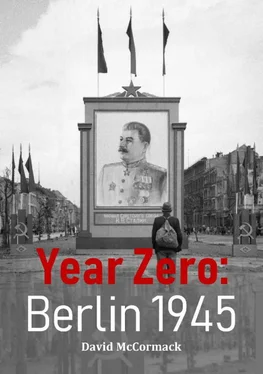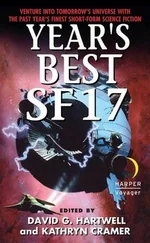Meanwhile, in Moscow, the sense of grief was no less palpable. To some degree Roosevelt had exercised a modifying influence upon Stalin, his manipulative geniality soothing the Soviet leader’s suspicious mind. However, the new man in the White House was something of an unknown quantity, and as such Stalin had to tread warily. Despite reassurances from Washington that it was a case of business as usual, the Soviet dictator was somewhat concerned about reports of German surrenders to Anglo-American units. On the Eastern Front German units were putting up fanatical resistance, whilst on the Western Fronts they appeared to be surrendering en masse. His jaundiced appreciation of the situation no doubt included a scenario in which German troops were being rearmed and re-equipped by the Anglo-American alliance for an anti-Communist crusade. Truman’s unplanned ascent to the presidency came at a time of a decline in mutual political confidence between the great powers. With this decline, the Americans and the Soviets pursued policies which were based on their own long-held principles, thus sowing the seeds of the Cold War.
In Berlin, Dr Joseph Goebbels had of late managed to rekindle some of the intimate friendship he had shared with Hitler before his disastrous affair with the Czech actress Lida Baarova which had nearly brought his marriage (and his political career) to an end. Baarova later recalled:
Hitler made a huge fuss about it. He called Goebbels in and told him to drop me and return to his wife and children. I couldn’t take the pressure and I returned to Prague. Goebbels never tried to contact me again.
Now in the gloomy depths of the Berlin bunker, Goebbels repaid his leader for not expelling him from his post by comforting him with readings of long passages from Thomas Carlyle’s Frederick the Great. Historical parallels were drawn between the seemingly miraculous deliverance of this revered figure in his darkest moments of despair and the death of Roosevelt. The incredible turnaround of fortunes which brought the Seven Years’ War to an end following the sudden death of the Czarina Elizabeth provided hope that history may just repeat itself. The passage which had the greatest effect on Hitler was the one in which Carlyle describes how fate had brought her nephew Peter to the throne:
We promised Frederick a wonderful star-of-day; and this is it – though it is long before he dare quite regard it as such. Peter, the successor, he knows to be secretly his friend and admirer; if only in the new Czarish capacity and its chaotic environments and conditions, Peter dare and can assert these feelings? What a hope to Frederick, from this time onward! Russia may be counted as the bigger half of all he had to strive with; the bigger, or at least the far uglier, more ruinous and incendiary; and if this were at once taken away, think what a daybreak when the night was at the blackest!
Incredibly, daybreak arrived within hours of a visit by Goebbels to the headquarters of 9 thArmy on the morning of 12 April, where during the course of an address to the assembled officers, he made a pointed reference to the ‘Second Miracle of the House of Brandenburg’. Following his address, one officer said, ‘Well, what Czarina is going to die this time?’. Goebbels replied, ‘I don’t know, but fate holds all kind of possibilities’. For Goebbels, news of Roosevelt’s death which had reached the Propaganda Ministry later that day, opened up new possibilities. Fate had seemingly intervened.
Goebbels was enraptured by the news of Roosevelt’s death. He ordered that the best champagne be brought out to celebrate. For a while, he could not quite believe it, the reports appeared so incredible. Just after midnight, he telephoned Hitler with the news, and in a tense and excited voice he said:
My Fuhrer, I congratulate you! Roosevelt is dead. It is written in the stars that the second half of April will be the turning point for us. This is Friday, April the thirteenth! Fate has laid low your greatest enemy. God has not abandoned us. Twice he has saved you from savage assassins. Death, which the enemy aimed at you in 1939 and 1944, has now struck down our most dangerous enemy. It is a miracle!
The telephone call ended with some speculation as to who would succeed Roosevelt. Perhaps the more moderate Truman might take on the role of Peter, bringing about the much anticipated change of fortune that might yet master fate. The following morning, Finance Minister Count Schwerin von Krosigk furthered the mood of jubilation by writing exultantly to Goebbels:
…I myself see in Roosevelt’s death a divine judgement, but it is also a gift from God that we shall have to earn in order to possess. This death eliminates the block that has obstructed all roads leading to contacting America. Now they’ll have to exploit this God-sent opportunity and do everything to get negotiations started. The only promising way, it seems to me, is through the intermediary of the Pope. As the American Catholics form a strong, united block – in contrast to the Protestants, who are split into numerous sects – the Pope’s voice would carry great weight in the U.S.A. Considering the seriousness of the military situation, we must not hesitate…
It was incredible that men such as Goebbels and von Krosigk could believe in the intervention of divine fate and providence, whilst their world collapsed around them. Be that as it may, their belief in historical parallels helped, for a while at least, to provide hope. Although, perhaps, this was the greatest deception of all.
Goebbels’ euphoria lasted until the first reports from the front on 13 April indicated that no discernible change of attitude by the Allies had been observed. Later that day, he confided in his Press Secretary, saying that, ‘Perhaps fate has again been cruel and made fools of us’. That day, Vienna fell to the Red Army. Four days later, Field Marshal Model’s Army Group B which had been defending the strategically important Ruhr area ceased all resistance against American forces. Sharing Goebbels’ delusions, Hitler still could not concede that the war was lost, Field Marshal Kesselring later observed that:
He was still optimistic. How far he was play-acting it is hard to decide. Looking back, I am inclined to think that he was literally obsessed with the idea of some miraculous salvation, that he clung to it like a drowning man to a straw.
Buoyed by his belief in providence and his own military genius, Hitler remained convinced that Berlin was not threatened by any immediate danger. Indeed, he considered that the anticipated Soviet offensive would be aimed at Prague, not Berlin. Had he too been taken in by Stalin’s disinformation which pointed towards an attack in that direction?
Whilst Hitler appeared sure where the next mighty blow by the Red Army would fall, Soviet strategic priorities appeared somewhat opaque to the Anglo-American Allies, largely due to Stalin’s obfuscations. On 15 April, a carefully worded query from the American Ambassador in Moscow regarding Soviet aims and objectives was skilfully parried by Stalin. He indicated that Eisenhower already knew that the impending major offensive on the Eastern Front was aimed at capturing Dresden. Indeed, Stalin had indicated as much at the Yalta conference in February. However, even as he spoke, final preparations were under way for the massive assault on Berlin.
Chapter Seven
The Paladins Depart
On 16 April, those Berlin cinemas still open were screening the patriotic films C omrades and Hallgarten Patrol, along with the light hearted comedies A Merry House, It All Started So Gaily, The Ideal Husband and the circus themed film The Big Number. Those with more elevated tastes could still visit the Berlin Philharmonic to see Robert Heger conduct a programme consisting of Beethoven’s Egmont Overture, Brahms’ Double Concerto and Death and Transfiguration by Strauss. Life somehow went on, even after the first indications of the Soviet onslaught were felt in the Berlin districts of Weissensee, Lichtenberg, Kopenick and Erkner. The sound and vibrations of the opening Soviet barrage did not penetrate as far as the more central Berlin districts, but news of the attack came quickly enough following a somewhat cautious radio announcement which said no more than that, ‘Heavy Russian attacks continue on the Oder Front’. The average Berlin citizen needed no elaboration, the moment they had long been dreading had finally arrived.
Читать дальше












